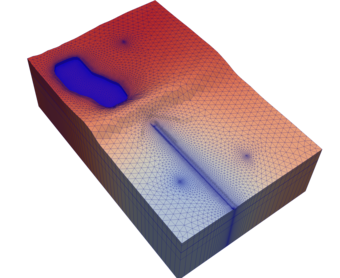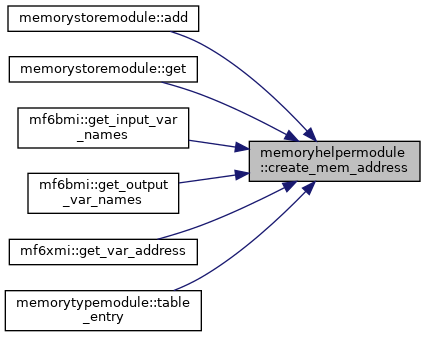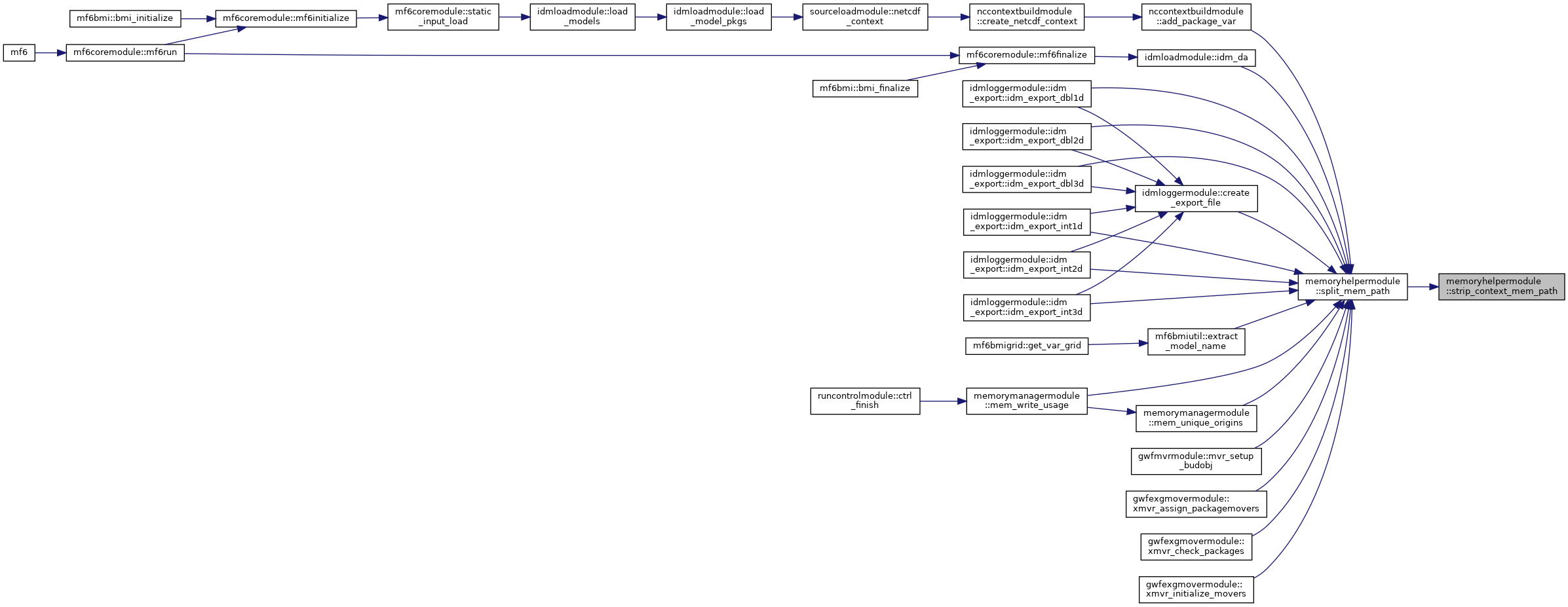 |
MODFLOW 6
version 6.7.0.dev1
USGS Modular Hydrologic Model
|
 |
MODFLOW 6
version 6.7.0.dev1
USGS Modular Hydrologic Model
|
Functions/Subroutines | |
| character(len=lenmempath) function | create_mem_path (component, subcomponent, context) |
| returns the path to the memory object More... | |
| character(len=lenmemaddress) function | create_mem_address (mem_path, var_name) |
| returns the address string of the memory object More... | |
| subroutine | split_mem_address (mem_address, mem_path, var_name, success) |
| Split a memory address string into memory path and variable name. More... | |
| subroutine | split_mem_path (mem_path, component, subcomponent) |
| Split the memory path into component(s) More... | |
| character(len=lenmempath) function | get_mem_path_context (mem_path) |
| Return the context from the memory path. More... | |
| subroutine | strip_context_mem_path (mem_path, mem_path_no_context) |
| Remove the context from the memory path. More... | |
| subroutine | mem_check_length (name, max_length, description) |
| Generic routine to check the length of (parts of) the memory address. More... | |
Variables | |
| character(len=lenmemseparator), parameter | mempathseparator = '/' |
| used to build up the memory address for the stored variables More... | |
| character(len=lenmemaddress) function memoryhelpermodule::create_mem_address | ( | character(len=*), intent(in) | mem_path, |
| character(len=*), intent(in) | var_name | ||
| ) |
Returns the memory address, i.e. the full path plus name of the stored variable
NB: no need to trim the input parameters
| [in] | mem_path | path to the memory object |
| [in] | var_name | name of the stored variable |
Definition at line 55 of file MemoryHelper.f90.


| character(len=lenmempath) function memoryhelpermodule::create_mem_path | ( | character(len=*), intent(in) | component, |
| character(len=*), intent(in), optional | subcomponent, | ||
| character(len=*), intent(in), optional | context | ||
| ) |
Returns the path to the location in the memory manager where the variables for this (sub)component are stored, the 'memoryPath'
NB: no need to trim the input parameters
| [in] | component | name of the solution, model, or exchange |
| [in] | subcomponent | name of the package (optional) |
| [in] | context | name of the context (optional) |
Definition at line 21 of file MemoryHelper.f90.

| character(len=lenmempath) function memoryhelpermodule::get_mem_path_context | ( | character(len=*), intent(in) | mem_path | ) |
NB: when there is no context in the memory path, a empty character string is returned.
| [in] | mem_path | path to the memory object |
Definition at line 145 of file MemoryHelper.f90.

| subroutine memoryhelpermodule::mem_check_length | ( | character(len=*), intent(in) | name, |
| integer(i4b), intent(in) | max_length, | ||
| character(len=*), intent(in) | description | ||
| ) |
The string will be trimmed before the measurement.
The description should describe the part of the address that is checked (variable, package, model, solution, exchange name) or the full memory path itself
| [in] | name | string to be checked |
| [in] | max_length | maximum length |
| [in] | description | a descriptive string |
Definition at line 197 of file MemoryHelper.f90.


| subroutine memoryhelpermodule::split_mem_address | ( | character(len=*), intent(in) | mem_address, |
| character(len=lenmempath), intent(out) | mem_path, | ||
| character(len=lenvarname), intent(out) | var_name, | ||
| logical(lgp), intent(out) | success | ||
| ) |
| [in] | mem_address | the full memory address string |
| [out] | mem_path | the memory path |
| [out] | var_name | the variable name |
| [out] | success | true when successful |
Definition at line 69 of file MemoryHelper.f90.

| subroutine memoryhelpermodule::split_mem_path | ( | character(len=*), intent(in) | mem_path, |
| character(len=lencomponentname), intent(out) | component, | ||
| character(len=lencomponentname), intent(out) | subcomponent | ||
| ) |
NB: when there is no subcomponent in the path, the value for
| [in] | mem_path | path to the memory object |
| [out] | component | name of the component (solution, model, exchange) |
| [out] | subcomponent | name of the subcomponent (package) |
Definition at line 106 of file MemoryHelper.f90.


| subroutine memoryhelpermodule::strip_context_mem_path | ( | character(len=*), intent(in) | mem_path, |
| character(len=lenmempath), intent(inout) | mem_path_no_context | ||
| ) |
NB: when there is no context in the memory path, the original memory path is returned.
| [in] | mem_path | path to the memory object |
| [in,out] | mem_path_no_context | path to the memory object without the context |
Definition at line 167 of file MemoryHelper.f90.


| character(len=lenmemseparator), parameter memoryhelpermodule::mempathseparator = '/' |
Definition at line 10 of file MemoryHelper.f90.